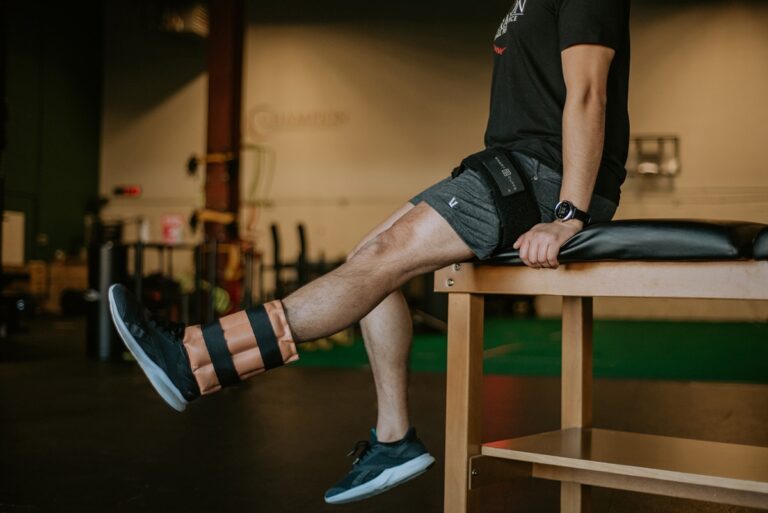We are proud to offer Blood flow Restriction Training (BFR) at our clinic, utilizing the B-Strong system. BFR is an advanced training technique being utilized in rehabilitation settings with people of all ages and abilities. In simplest terms, we can achieve faster and stronger results while doing less.
If you’re interested more in the science behind Blood Flow Restriction Training, check out the B-Strong website

Blood Flow Restriction Training, or BFR, works by utilizing pressurized cuffs around either the arms or legs (or both!), with the purpose of reducing blood flow to a target muscle group. The decrease in blood flow causes the muscles to work much harder under significantly less resistance. In other words, we can reap the same benefits as as a high intensity workout without putting excessive strain or pressure on healing tissues. The result is more strength, power and endurance with less pain, irritation and time.
During a BFR session, exercises will be focused on high repetitions while wearing the BFR cuffs.
Studies have shown the benefits of BFR include improvements in strength, muscle hypertrophy (size), circulation, endurance and bone mineral density.
BFR is useful for anyone looking to build strength, muscle, endurance, power and/or bone density. It’s especially useful for:
This list is far from exhaustive and BFR can be integrated into most rehabilitation programs to speed up recovery
BFR is useful for everyone, from young athletes to our senior citizens. It is a proven safe and effective means to regain strength.
For our active clients, we can train harder and faster while respecting the healing processes of the tissues.
For older clients, BFR can allow us to work around the limitations that come with degenerative conditions like Osteoarthritis, build better bone density and improve overall health.
That said, there are certain conditions in which BFR is not advised including (but not limited to): recent fracture, early phase post-surgical care, vascular disease and pregnancy. Your PT is here to make sure you recovery safely and you’ll be advised if BFR is not right for you.
While adverse effects are rare, possible side effects of BFR include muscle soreness, fatigue, muscle pain, temporary numbness and dizziness.
You are at risk of developing reactions to BFR if you have a poor circulatory system, diabetes, sickle cell, obesity, renal compromise, or severe hypertension. Other people who should avoid BFR training are people with venous thromboembolism, sickle cell anemia, tumor or cancer, acidosis, open fracture, and increased intracranial pressure vascular grafts. If you are taking medication to increase clotting risk, you should also avoid this form of treatment.

Our new office will be open to patients on January 2nd, 2023
Please contact us at evan@altiusnj.com or at (201) 391-8932 for more details!